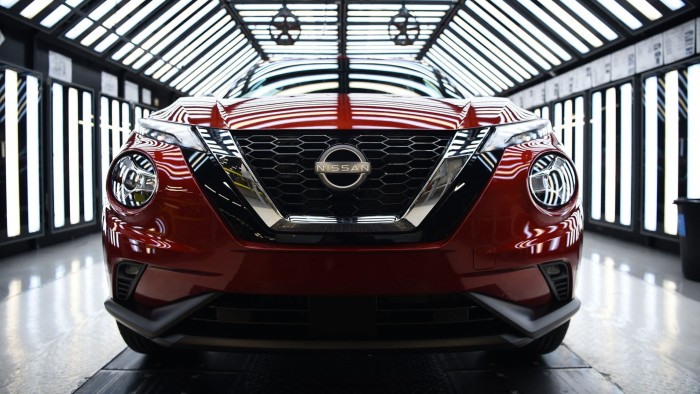Unlock the Editor’s Digest for free
Roula Khalaf, Editor of the FT, selects her favourite stories in this weekly newsletter.
Nissan’s new chief executive has warned that the long-term future of its Sunderland car plant is not assured as he signalled the possibility of its Chinese partner using the facility to produce vehicles.
Ivan Espinosa, who took over as Nissan boss in April, told the FT Future of the Car summit that Sunderland was unlikely to be among the seven factories being shut down, just days after unveiling a sweeping turnaround plan that involves mass lay-offs and cutting its production to 10 plants.
“We have announced that we are launching new cars in Sunderland . . . In the very short term, there’s no intention to go around Sunderland,” said Espinosa.
But he added that the company needed UK government support in terms of subsidies or measures to lower energy costs, emphasising that it struggled to compete with Chinese electric vehicle imports.
“Things like energy and a few other things are not as competitive as they are in other markets, and we need support from the government to remain competitive in the UK and keep our plant moving forward,” said Espinosa.
In 2023, Nissan announced a £1.12bn investment in its Sunderland plant to make two new electric models at the site, but also warned of job cuts in the UK because of the government’s EV targets, which have since been watered down.
Last week, its battery supplier AESC secured a £1bn funding package from the UK government for a new battery plant in Sunderland that will be used to produce Juke and Leaf electric models.
As part of Nissan’s turnaround, the Japanese group has unveiled plans to work more closely with Dongfeng, its partner in China for more than 20 years, to export vehicles jointly developed in China.
Espinosa said he was open to the idea of Dongfeng producing its vehicles at Nissan’s factory in Sunderland — a move that could be controversial for UK Prime Minister Sir Keir Starmer, given that Dongfeng is a state-owned entity.
“Everything is on the table,” said Espinosa, who also confirmed that a Chinese group was one option in the hunt for a strategic partner after merger talks with Honda fell apart. “We could leverage some of our joint work outside of China, inviting them to come into our production ecosystems — everything is open,” he added.
Espinosa’s reassurances will provide some comfort for the workers at Sunderland and UK government officials, after fears that the plant could fall victim to the cost-cutting measures announced on Tuesday.
Nissan has a further 1,000 jobs in the country related to research and development, design and other functions.




